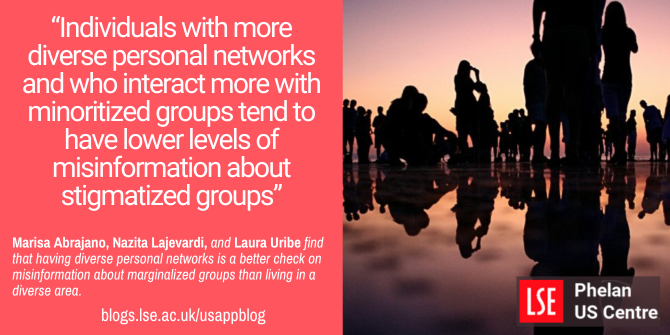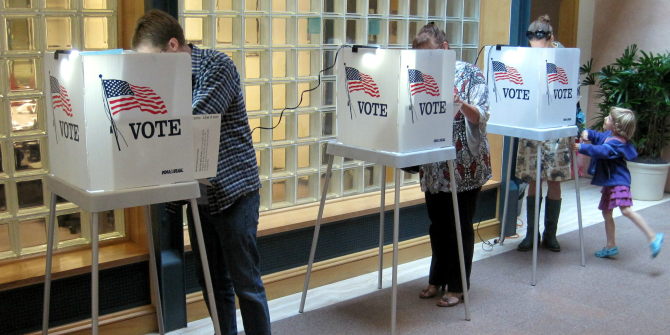

 Recent elections have shown the impact of misinformation in politics and its influence on voters. In new research Marisa Abrajano, Nazita Lajevardi, and Laura Uribe examine how who people know and where they live shape the amount of misinformation they believe about marginalized groups. Through survey research, they uncover that the diversity of people’s personal connections plays a far more influential role in shaping our misinformation compared to where they live and who they live close to. Those who have a more diverse personal network – including white Americans and Republicans – are likely to be less misinformed about marginalized communities.
Recent elections have shown the impact of misinformation in politics and its influence on voters. In new research Marisa Abrajano, Nazita Lajevardi, and Laura Uribe examine how who people know and where they live shape the amount of misinformation they believe about marginalized groups. Through survey research, they uncover that the diversity of people’s personal connections plays a far more influential role in shaping our misinformation compared to where they live and who they live close to. Those who have a more diverse personal network – including white Americans and Republicans – are likely to be less misinformed about marginalized communities.
The aggressive rise of misinformation in politics poses much harm––to elections, to democracy, and especially to the people on the receiving end of harmful and deceitful rhetoric. Spreading fictitious narratives has now become as easy as sharing an article through social media. While some companies have made progress in flagging these sources of misinformation, it is altogether another battle to target people’s beliefs about what is true and what is not.
How does who you know and where you live shape what you know?
Misinformation campaigns often target vulnerable populations. In the case of the US, recent years have seen such campaigns focus disproportionate attention on undocumented immigrants, Muslims, and racial and ethnic minorities. But we know that not everyone falls prey to misinformation. Our curiosity lied in more than just who tended to hold more misinformed views about these groups of people, but pivotally, how who you knew and where you lived shaped one’s misinformation levels about socially stigmatized populations.
Our social and political context shapes who we are: we hypothesized that knowing people who were socially marginalized, living in areas with high levels of racial diversity, and living in areas with more Democratic presidential support would lead to lower levels of misinformation. Additionally, we contended that these social and political environments would differentially affect white and Republican respondents. That is, living in these contexts will reduce levels of misinformation among white and Republican respondents more than their Black and global majority and Democratic or Independent peers.

Photo by Mario Purisic on Unsplash
Analyzing Americans’ exposure to misinformation
We fielded three surveys in January, September, and October-November 2019, surveying nearly 4,3000 US-based respondents. We used survey weights to ensure our respondent population was representative of the US general population.
Respondents were asked about a dozen questions to better understand their levels of (mis)information. These included questions like “Do you think most of the immigrants who are now living in the United States are here legally or are without legal status? “or prompts like “Most terrorist incidents on U.S. soil have been conducted by Muslims.” Only those who provided a factually untrue answer were coded as “misinformed.” This is because people who selected “don’t know” are arguably un-informed, not misinformed, about these questions.
Respondents were also asked about who they knew and where they lived. Specifically, they listed whether they personally knew at least one person who was Black, Asian American, Latino, or Muslim. This became our variable called Diverse Network, which we coded in an additive way. That is, if they knew at least one Black person and one Latino person, they would get a score of 2, but if they knew just many Asian people, the respondent would only get a score of 1.
We also received the zip code of the respondents who took the survey. From the zip code, we were able to identify which county they resided in. We used data from the MIT Election Data and Science Lab to get their county’s democratic vote share in 2016, and we merged in data pulled from the census to determine percent of their county’s Black and global majority residents.
Personal connections are the key to reducing misinformation
Our findings challenge the idea that where we live and who lives close to us shape our views about minoritized individuals. Instead, our findings uncover that it’s the diversity of our personal connections that plays a far more influential role in shaping our misinformation––or, rather, correct information––about socially marginalized populations.
Though social context, political context, and personal contact each individually influenced a person’s level of misinformation, our analyses showed that of the three key independent variables we examined, having diverse personal connections was the most consistent and powerful predictor of lower levels of misinformation beliefs about minority groups. This held true across the three different surveys we conducted, in which all results for having a diverse personal network led to significant and lower levels of misinformation.
Even among white Americans and, to a slightly lesser extent, Republicans, having a more diverse personal network was linked to being less misinformed about minority communities. In two of our three surveys, the 2016 Democratic presidential vote share in a respondent’s county was significantly related to having lower levels of misinformation, but this finding was not significant in the third survey, yielding mixed results. In addition, residing in a more diverse country yielded insignificant results throughout.
Our main take-away is that individuals with more diverse personal networks and who interact more with minoritized groups tend to have lower levels of misinformation about stigmatized groups, all else being equal. This suggests that expanding our personal networks to welcome people different from us could be one potential avenue for combatting the racial divide on widespread beliefs.
- This article is based on the paper, ‘Context, Contact, and Misinformation about Socially Marginalized Groups in the United States’, in The Journal of Race, Ethnicity, and Politics.
- Please read our comments policy before commenting.
- Note: This article gives the views of the author, and not the position of USAPP – American Politics and Policy, nor the London School of Economics.
- Shortened URL for this post: https://wp.me/p3I2YF-dIO






